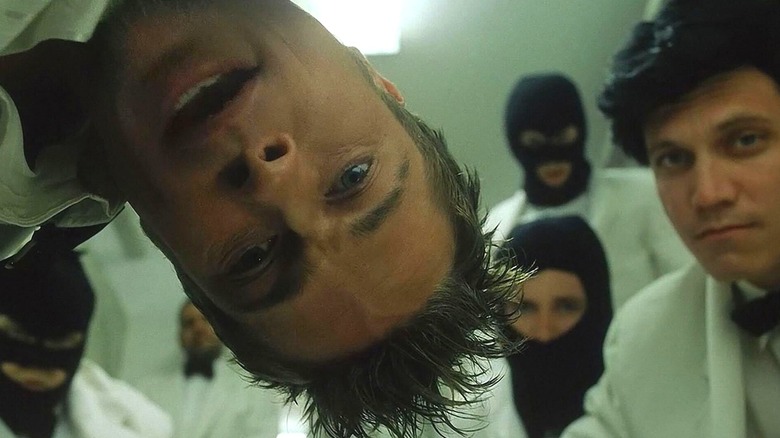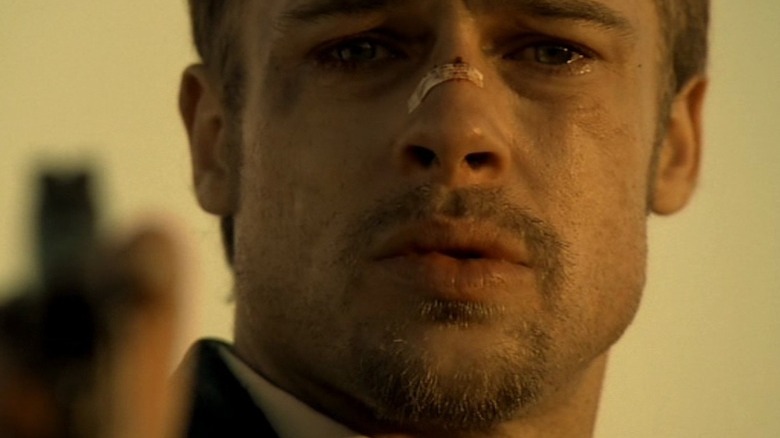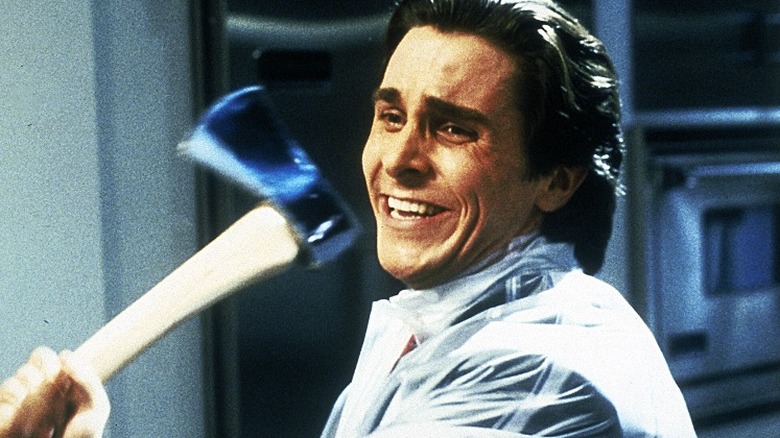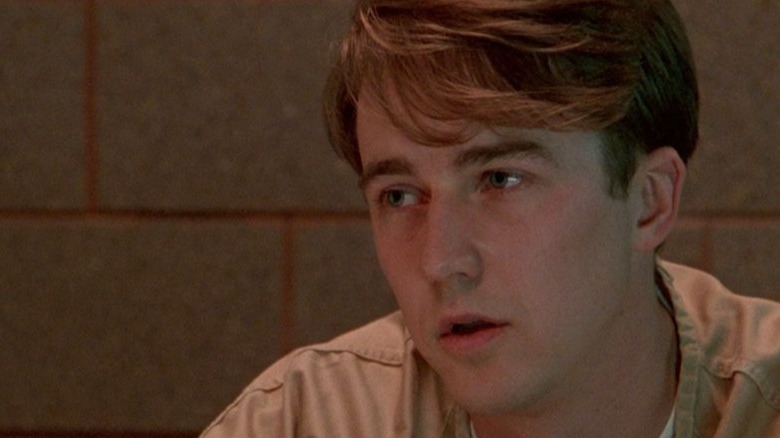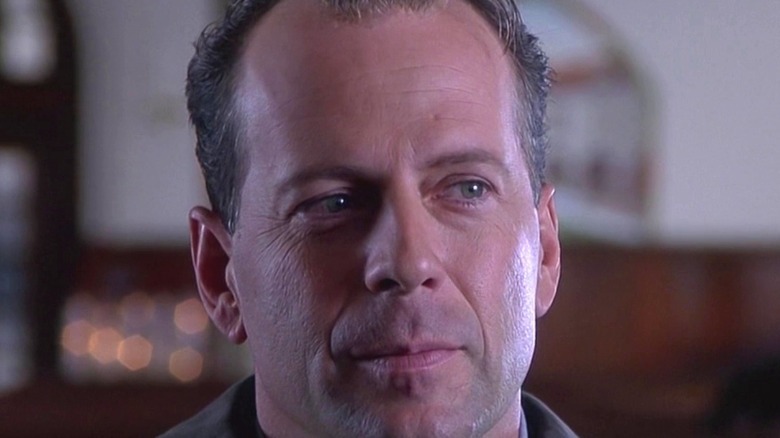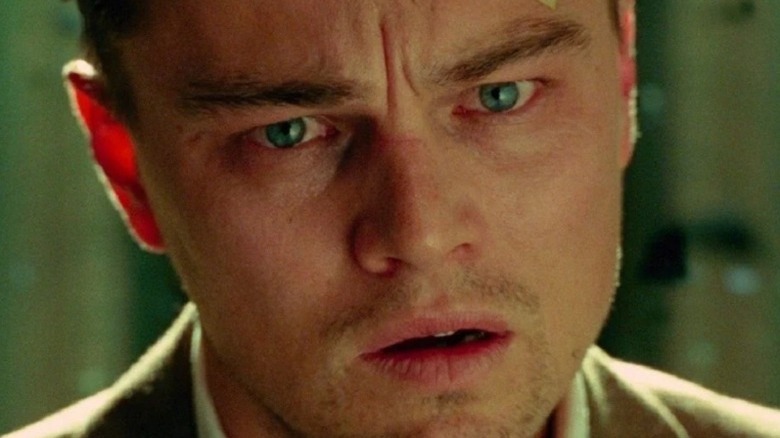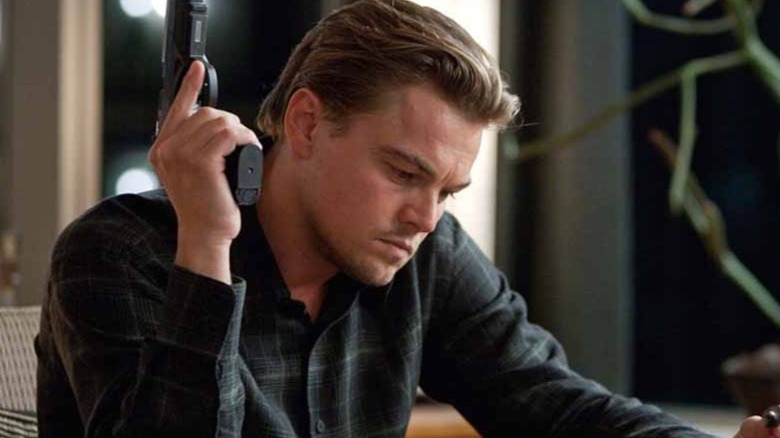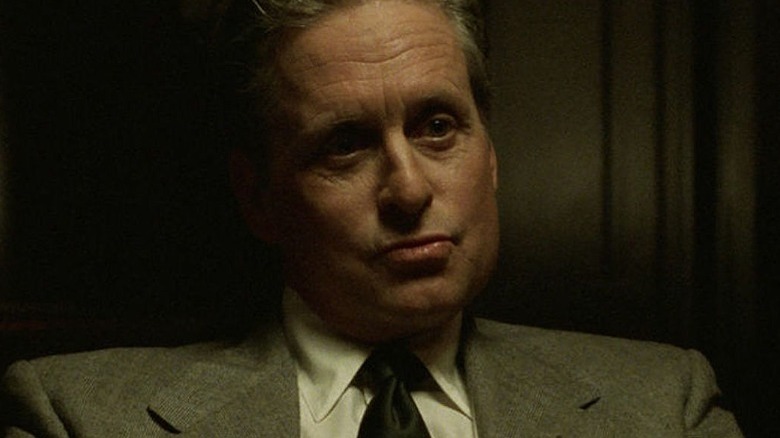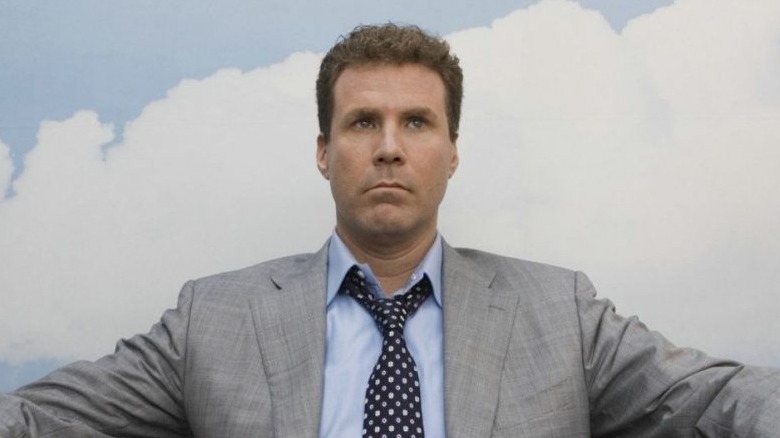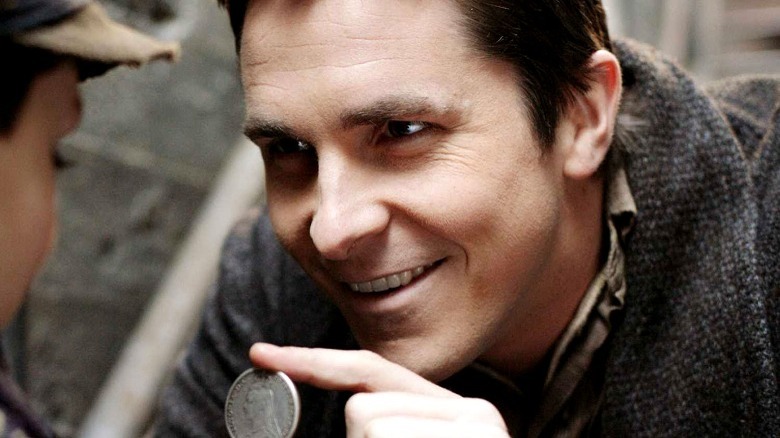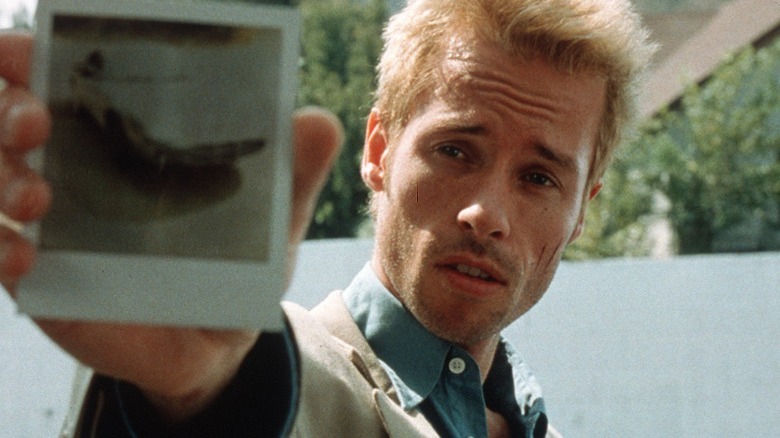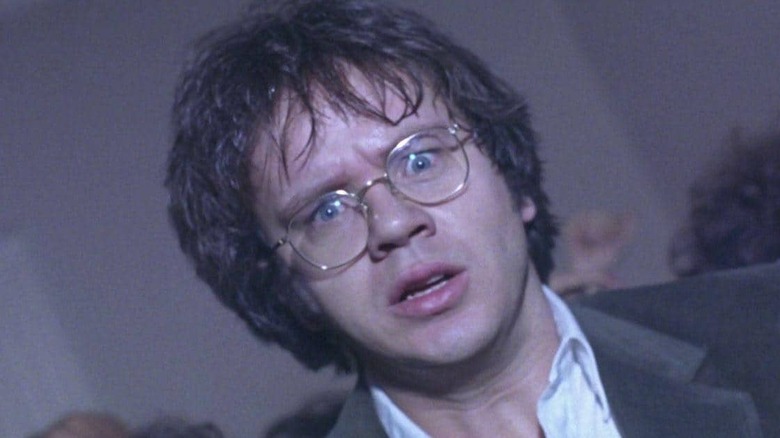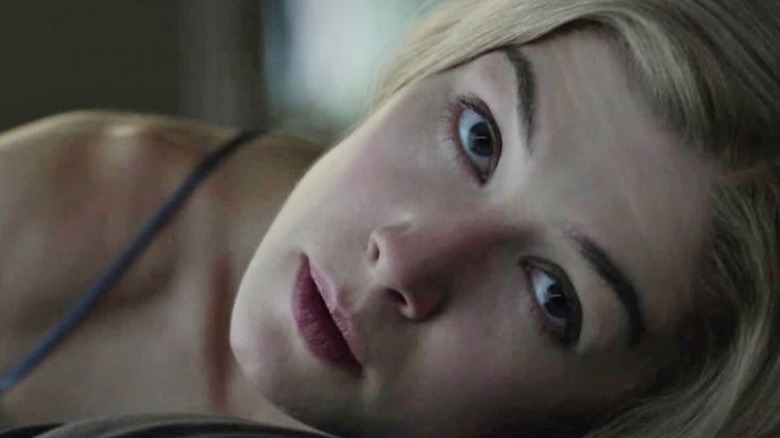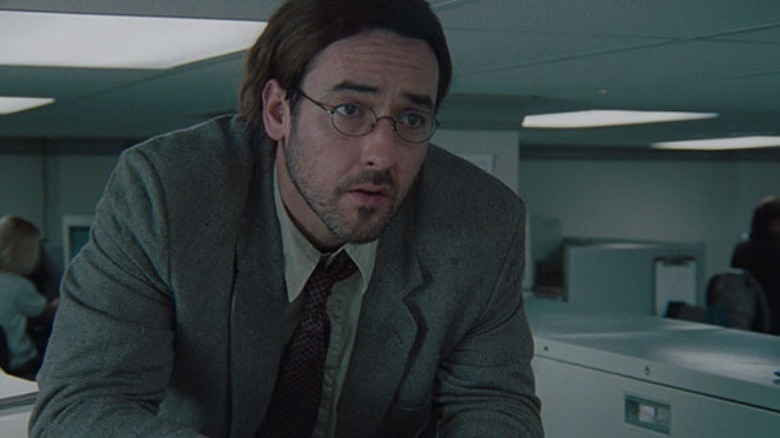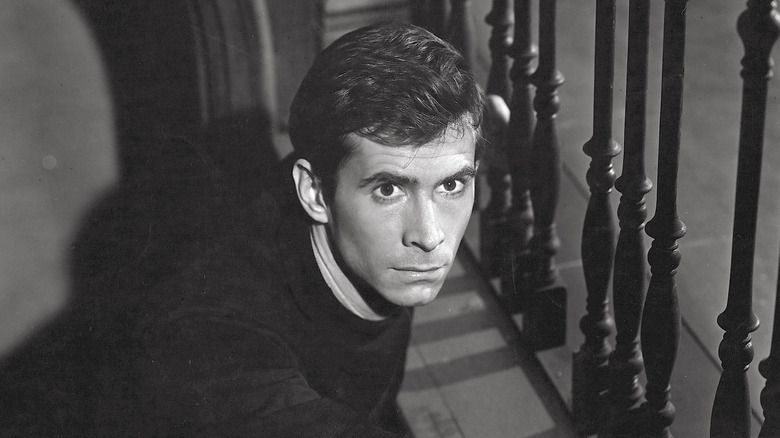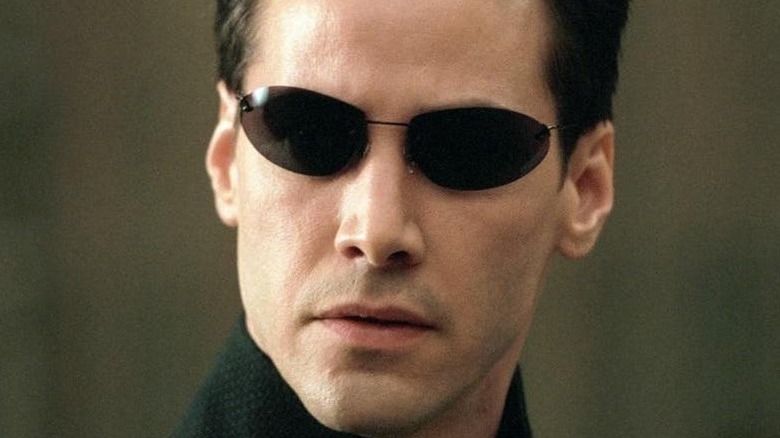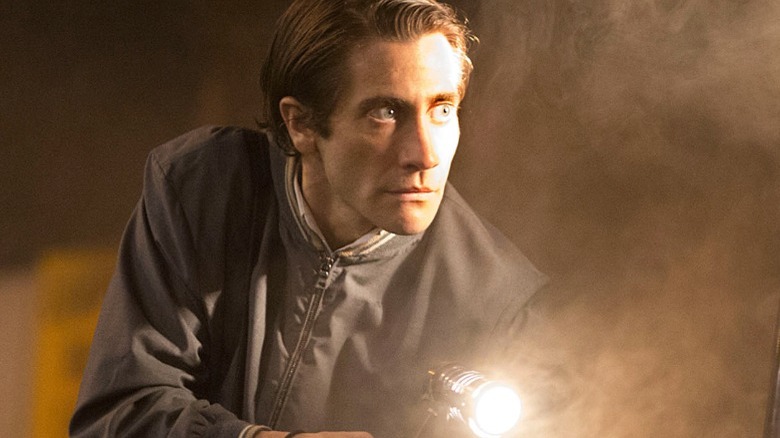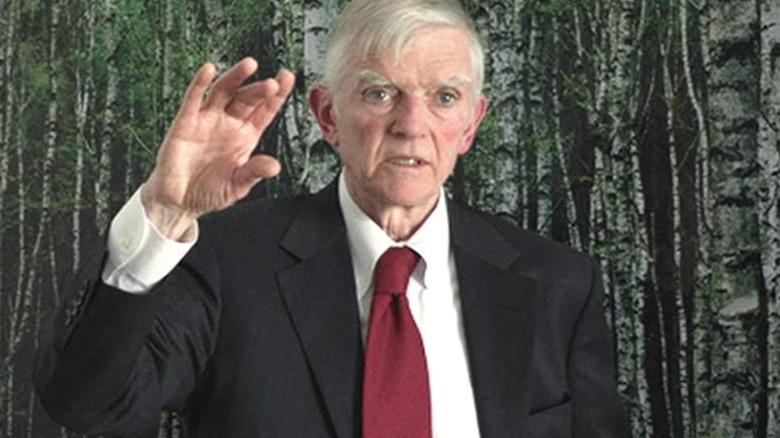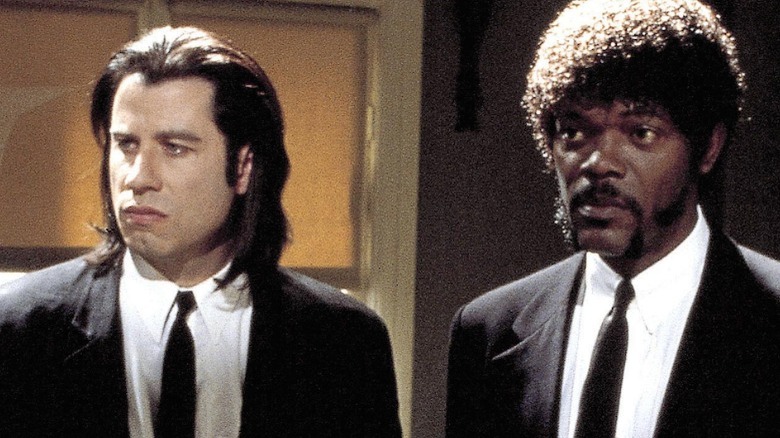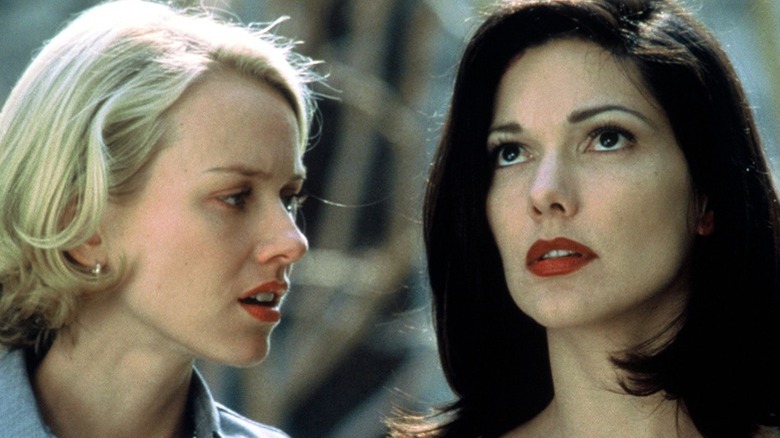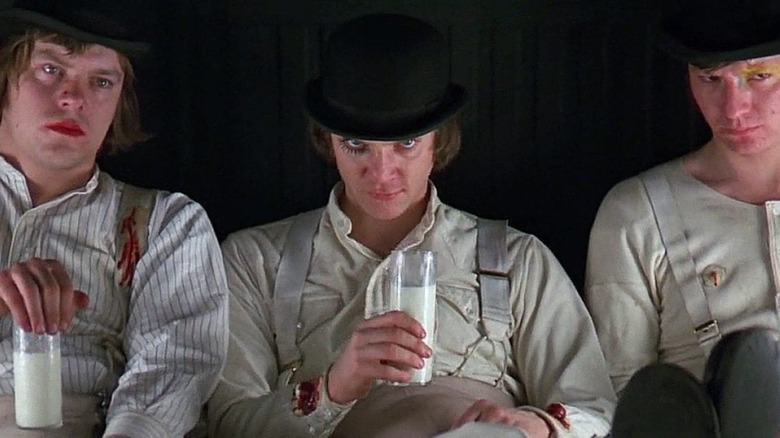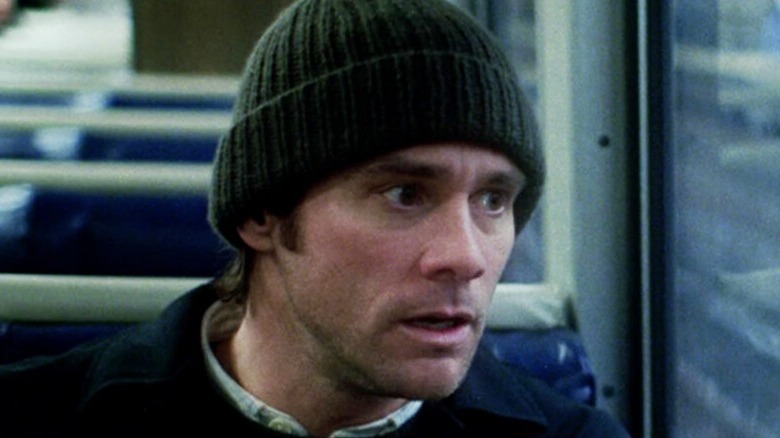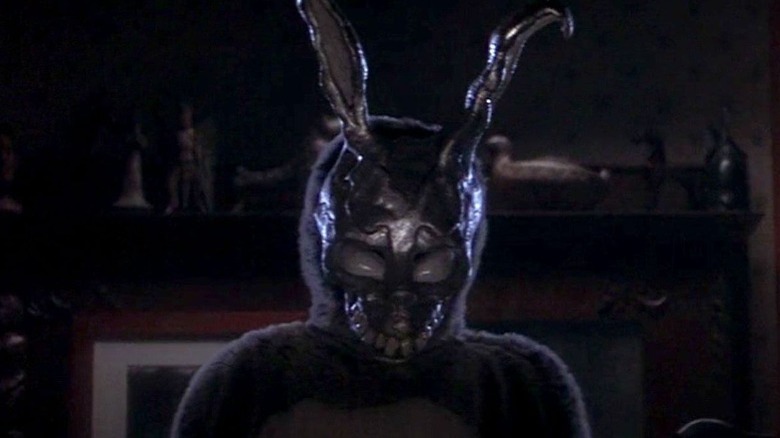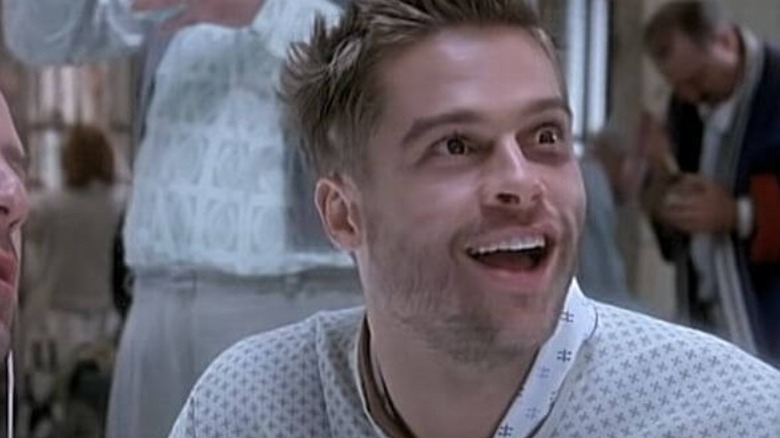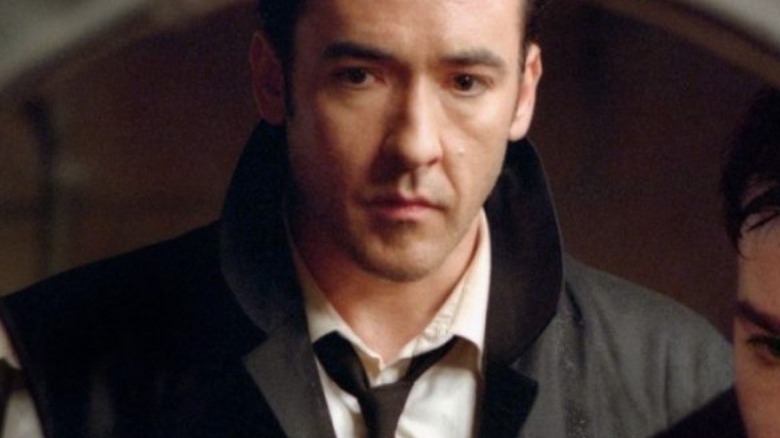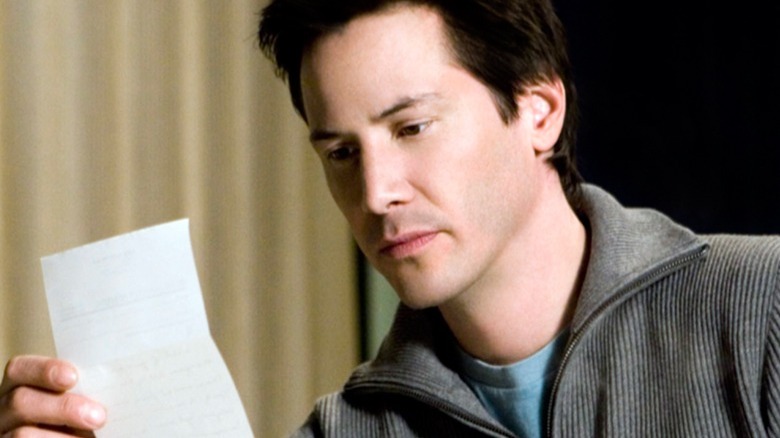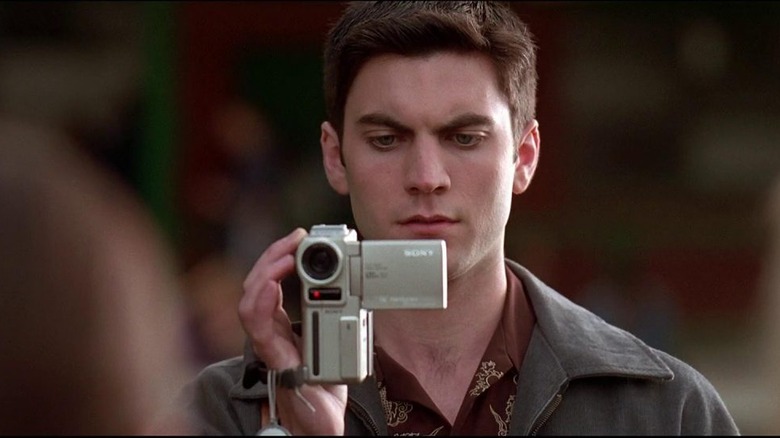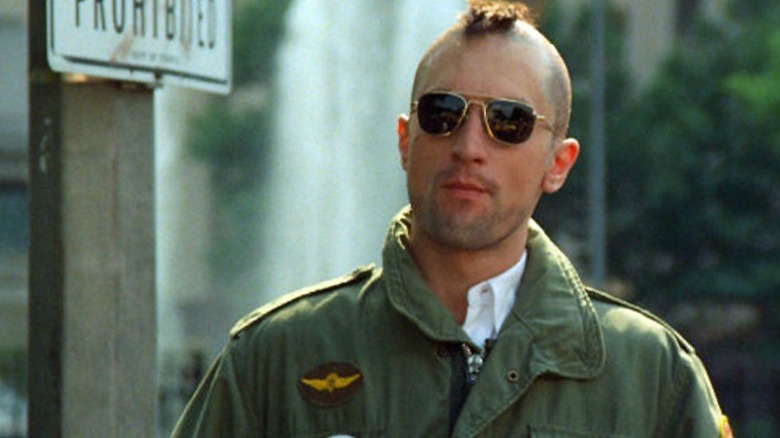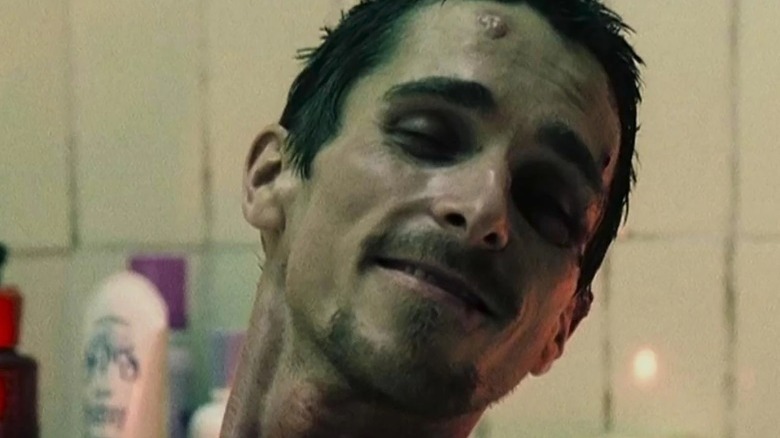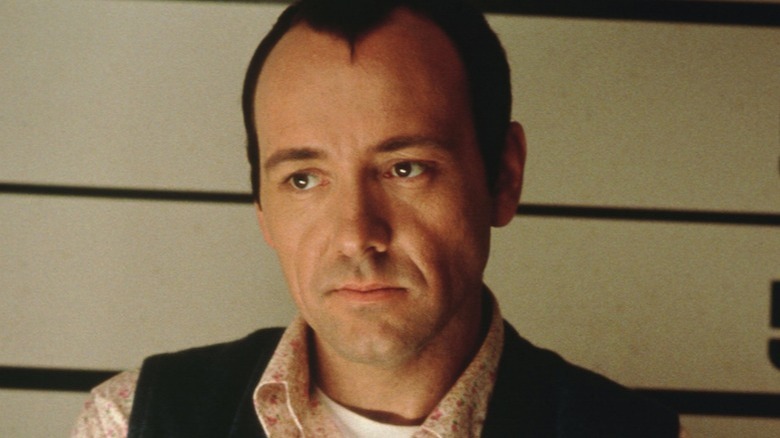30 Movies Like Fight Club You Need To See Next
We may receive a commission on purchases made from links.
Although "Fight Club" is now considered a classic masterpiece, the movie was not always as popular as it is today. When it was first released in 1999, it failed to live up to expectations and bombed at the box office. Yet, it managed to attract a dedicated cult following and began to grow in stature as more people revisited the movie following its home release.
The film tells the story of the disillusioned unnamed narrator (Edward Norton) and the anti-capitalist Tyler Durden (Brad Pitt) as they use violence as a way of finding satisfaction in their boring lives. They soon find more recruits as disgruntled men who are searching for meaning, while Durden enacts a plan to end consumerism and break down the economy once and for all.
"Fight Club" is often heralded as a great work of satire and is famous for its bizarre twist ending. Yet, there are lots of other similar films out there that explore common themes or twists that are just as enigmatic. If you love "Fight Club" and want to know what other movies should be right up your street, make sure you check out these films next.
Se7en
"Se7en" is another David Fincher film and again stars Brad Pitt, this time opposite Morgan Freeman. The movie revolves around two police detectives attempting to catch a serial killer. This murderer is seemingly choosing his victims based on the seven deadly sins, killing them in sadistic ways that suit their crimes. With it soon becoming clear that there is a wider scheme in play, the pair must race to stop the killer before it is too late.
Like all of Fincher's other movies, "Se7en" is a complex and deep experience that can be a lot to take in at once. The script is compelling, driving along the action and ensuring that no scene is wasted, just like in "Fight Club." Similar to his later movie, this 1995 film asks viewers searching questions and keeps them guessing throughout. Of course, it is also a brutal film that constantly pushes the boundaries of cinema.
American Psycho
Based on the novel by Bret Easton Ellis, "American Psycho" is a horror film directed by Mary Harron that stars Christian Bale as Patrick Bateman. He is an investment banker who lives in New York City but has turned to a life of violence. Bateman is shown to be a serial killer, who murders those around him who make him feel inadequate, as he descends further and further from reality.
In "Fight Club" and "American Psycho," the focus is on young men who live middle-class lives and are pretty comfortable but are disillusioned with the world. They detest the consumerist nature of society and are dissatisfied with what they see as the diminishing role of masculinity. Both come to resent the structures in place and turn to violence as a way of finding fulfillment. The two characters' mental health is a focus as well, with the two questioning their own sanity throughout the films.
Primal Fear
"Primal Fear" is a legal thriller based on the novel by William Diehl. It stars Richard Gere, Laura Linney, and Edward Norton among others. In it, prominent defense attorney Martin Vail takes on the case of an altar boy who is accused of murder. As he learns more about his client, Vail discovers he has dissociative identity disorder and has no recollection of an aggressive personality known as Roy. By the end of the movie, things have turned completely upside down, leaving Vail dumbstruck by what has happened.
The most obvious similarity between "Primal Fear" and "Fight Club" is the fact that each features a character with dissociative identity disorder, where they have a separate personality. Each film includes a subject that is, at least partially, controlled by rage and is unsure of their place in the world. There are even fan theories linking the two films together as one continuous story.
The Sixth Sense
Few films have captured the public's attention quite like "The Sixth Sense." Starring Bruce Willis and directed by M. Night Shyamalan, the film features a child psychologist helping a young boy named Cole. This child claims to be able to see and communicate with ghosts and the pair work together to help him come to terms with his ability. At the conclusion of the film it is revealed that Willis' character was dead all along.
Like David Fincher, M. Night Shyamalan has developed a reputation for having twist endings in his movies. Few have been bigger or more shocking than the revelation at the end of "The Sixth Sense," making it perfect for those who like to have the rug pulled out from under them at the very last moment. The film litters clues throughout hinting at the twist just like "Fight Club" and demands at least a second watch so viewers can see exactly what they missed the first time around.
Shutter Island
Adapted from the novel of the same name, "Shutter Island" is a 2010 psychological thriller that stars Leonardo DiCaprio in the lead role. Directed by Martin Scorsese, the film tells the story of a US marshal who travels to Ashecliffe Hospital for criminals. During the story, it's revealed that not everything is as it seems and Teddy Daniels is forced to confront the truth for why he is at the hospital.
One of the big draws of "Fight Club" is how it can mess with your mind. There's a constant feeling that something is wrong but it's impossible to work out exactly what it is. That's what "Shutter Island" does so well, pulling viewers into a world that is then torn apart and drastically changed. The story is gripping and will appeal to those who love a shocking revelation that they didn't see coming.
Inception
Created by Christopher Nolan and starring Leonardo DiCaprio, "Inception" is a sci-fi action film that sees professional thieves engaging in corporate espionage in people's dreams. They effectively enter the subconscious of their victims using sophisticated technology and steal or plant ideas. With the characters entering successive levels of dreams, the world around them becomes less and less real, to the point that it's possible for them to do almost anything they want.
In the same way as "Fight Club," this movie is incredibly difficult to follow. It will require at least a few watches to take everything in and be sure of what exactly is going on. The mind-bending plot and big ideas can seem overwhelming at times and will definitely have viewers questioning things about their own lives in the same way that "Fight Club" did when it was first released.
The Game
"The Game" is a 1997 thriller that starred Michael Douglas and Sean Penn. Directed by David Fincher, it starts with businessman Nicholas van Orton receiving a bizarre gift from his own brother. It essentially puts him into a game that is played in real life, with events soon blurring as it becomes unclear what and who is actually part of the game. The story quickly takes a number of surprising twists as van Orton begins to believe that everyone is scheming against him.
Like Fincher's other movies, "The Game" has its fair share of plot twists to keep viewers guessing what will happen next. It demands to be watched multiple times just so you can properly take in everything. There's also a good mixture of a gripping and mysterious atmosphere, along with plenty of dark humor. Coupled with a familiar visual style and the constant feeling of suspense, "The Game" is an easy recommendation for "Fight Club" fans.
Stranger Than Fiction
"Stranger Than Fiction" is a 2006 film that sees Harold Crick experience a voice in his head that narrates his life in real time. When it is revealed that Crick will soon die in this spoken narrative, he goes to extreme lengths in an attempt to prevent his death and change the ending of the story. Events spiral as the character loses control of his life and eventually meets with the author responsible for the narration and accepts his death.
The one major element that is present in both "Stranger Than Fiction" and "Fight Club" is that each main character is struggling to live their lives while a voice inside their heads controls their actions. Of course, the Narrator is unaware that Tyler Durden is imaginary, though he is nevertheless a made-up figure guiding his behavior. The two battle to be their own person in the end and not simply be told what they have to do by the voice in their heads.
The Prestige
"The Prestige" is a Christopher Nolan film that stars Hugh Jackman and Christian Bale as two stage magicians in the 19th century. The pair see each other as fierce rivals and are constantly trying to outdo each other in an obsessive competition to create the best illusion possible. This leads to deadly consequences as the two go to greater lengths to be seen as the superior magician.
Like David Fincher, Christopher Nolan has developed a reputation for creating mystery thrillers that examine personal identity, memory, and the truth of knowledge. "The Prestige" is no different in that respect and keeps those watching it trying to second guess what will happen next. It has a few mind-bending moments as well, though it is the sheer drama that happens in almost every scene that keeps you hooked.
Memento
Directed by Christopher Nolan, "Memento" is another mystery thriller that fans of "Fight Club" will have a good chance of enjoying. It stars Guy Pearce, Carrie-Anne Moss, and Joe Pantoliano as characters involved in a revenge plot. The main character suffers from amnesia and has to use tattoos and notes to remember short-term memories. With two timelines running simultaneously, one in reverse and the other normal, they meet in the middle and finally reveal what really happened.
While the two movies explore different parts of the psyche, they take a similar approach. "Memento" is a nerve-racking experience from start to end and hardly ever gives you a chance to contemplate what is going on, in much the same way that "Fight Club" does. The two movies are both viewed as mystery thrillers that keep the viewer anxious and have even been included in DVD collections together.
Jacob's Ladder
Adrian Lyne directed this psychological horror film in 1990. The likes of Tim Robbins, Elizabeth Peña, and Danny Aiello all star in "Jacob's Ladder," a movie that follows a former soldier who was deployed to Vietnam and saw much of his unit killed in an ambush. The action takes place some four years later, with the character Jacob now working in New York City as a postal clerk. Haunted by what happened in Vietnam, he has mysterious visions and strange hallucinations that he can make no sense of, forcing him to get to the bottom of what is happening to him.
Filled with horrifying imagery, "Jacob's Ladder" explores themes of paranoia and understanding one's self, much in the same way that "Fight Club" does. Yet, there are also other similarities. Whether it's the fast pace of the action as each scene rolls by in a non-stop fashion or the mangled plot that is impossible to predict, it shares many features with "Fight Club" and will keep viewers questioning everything they see until the end.
Gone Girl
"Gone Girl" is a psychological thriller that stars Ben Affleck, Rosamund Pike, Neil Patrick Harris, and Tyler Perry. The plot features an unhappily married couple who are on the verge of ending their relationship. Wife Amy tries to frame her husband for murder by staging her own disappearance, although things quickly spiral from there as her elaborate plans unravel and she is forced to reevaluate.
With David Fincher establishing himself within the psychological thriller genre, it's little surprise that many of his films share a kind of kindred spirit. Like "Fight Club," it is clear from just a few moments into the movie that not everything is as obvious as it first appears. There's a feeling of constant suspense as the story twists and turns in unexpected ways, making it an ideal watch for any fan of Fincher's previous work.
Being John Malkovich
The Spike Jonze film "Being John Malkovich" is a comedy film with John Cusack starring alongside Cameron Diaz and Catherine Keener. Living an unhappy existence, the main character suddenly comes across a portal that allows him to enter John Malkovich's mind. This discovery amazes his co-workers and partner but spirals out of control, eventually leaving him alone and trapped, helplessly watching his two loves living happily together.
While "Fight Club" does have its funny moments, "Being John Malkovich" is more obviously a comedy. It is a surreal world that isn't quite as grounded in reality as David Fincher's 1999 film. Yet, it does have some shared elements. Most notable among them is the destruction of romantic relationships due to an inability to come to terms with their own mental problems and selfishness.
Psycho
"Psycho" is one of the first psychological thrillers and one that leans heavily into the horror genre as well. Directed by Alfred Hitchcock, it is based on Robert Bloch's novel and stars Anthony Perkins as Norman Bates. The hotel manager is seemingly polite, but also secretive and nervous. The mysterious Bates also has a keen interest in taxidermy and a very strained relationship with his mother, although things are not exactly what they seem.
Like "Fight Club," this movie contains a lot of violence and was one of the films that set a standard for what kind of dark material is acceptable in Hollywood pictures. The main characters in both films suffer from dissociative identity disorder, with Bates creating an alternate personality of his mother in his mind. Despite the fact that they each are examining different themes, the focus on the broken minds of the characters is a central and integral part of them both.
The Matrix
"The Matrix" became a phenomenon when it first hit screens in 1999. The Wachowskis wrote and directed the movie, which features Keanu Reeves as a computer hacker and prophesied hero Neo. Trapped in a computer simulation by machines, most of humanity is effectively enslaved as Neo and his new rebellious colleagues work together to try and overthrow their overlords.
While at first glance "The Matrix ” might seem nothing like "Fight Club," a closer examination of their underlying themes shows that they are attempting to deal with the same issues. Each of the movies features a protagonist who is unsatisfied with his day-to-day life and has suspicions that something is wrong with the world. They then rebel to free themselves from society, with Neo waking up from the Matrix and Tyler Durden starting the fight clubs as a way of not conforming. Essentially, both try to explain how the world around is phony and should be destroyed to free those trapped within it.
Nightcrawler
"Nightcrawler" is another psychological thriller that stars Jake Gyllenhaal in the role of Louis Bloom. The character finds himself becoming a stringer, someone who films violent crimes and sells footage to news stations. However, he soon starts getting more involved in events as he attempts to get the best and most shocking footage possible. The film culminates with Louis showing just how far he is willing to go for fame and fortune.
In the same way that "Fight Club" focuses on a world where the truth is often obscured, "Nightcrawler" also deals in half-truths, with Louis hiding his actions throughout. But where they most closely align is with the scathing criticism of capitalism. Tyler Durden absolutely despises the consequences of capitalism and much of "Fight Club" is about how it has left behind many people while only making some richer. "Nightcrawler" is equally biting when it comes to capitalism, although it is not quite as overt as David Fincher's movie.
Secret Window
Starring Johnny Depp, "Secret Window" is a psychological thriller directed by David Koepp. Featuring some horror elements, the film sees writer Mort Rainey moving away to a remote cabin after divorcing his wife and suffering from writer's block. When he is accused of plagiarizing the work of another writer, he uncovers that this second person is really part of his own imagination as a result of his undiagnosed dissociative identity disorder.
One of the things that made "Fight Club" so well-liked is that it keeps you second-guessing everything that you see. You can't be sure that anything is actually real or how much the protagonist really knows. This is exactly the same in "Secret Window," with the plot twisting and turning as it moves towards the conclusion. The fact that both movies also deal with a protagonist who has somehow split their own personality after a traumatic event links them together.
Inside Job
"Inside Job" is a documentary that deals with the 2008 financial crisis, charting what caused the economic disaster and the consequences it had for ordinary people around the world. It attempts to expose the deep corruption at the heart of the financial services and how most of those involved in causing the problem escaped without suffering any real repercussions. It received widespread critical acclaim and won an Academy Award for Best Documentary Feature.
Fundamentally, "Inside Job" and "Fight Club" are two very different films. One is a documentary and the other is a fictional thriller. However, they both have a major focus on the economy, with David Fincher's movie heavily criticizing consumerism culture and the effect it has on society. Tyler Durden wants to see the world burn, with financial structures destroyed and debt erased. "Inside Job" shows what can happen when this economic structure is given free rein.
Pulp Fiction
"Pulp Fiction" is widely considered to be Quentin Tarantino's best film and the one that propelled him to mainstream success. Featuring an ensemble cast including the likes of Bruce Willis, Samuel L. Jackson, Tim Roth, Uma Thurman, and John Travolta, it features multiple intertwining stories that are told out of order. In total, there are seven individual acts and three primary storylines that connect to each other in some way or other.
In the same way that "Fight Club” is a violent film filled with black comedy, "Pulp Fiction" also blurs the line between the two. The Tarantino movie is unconventional and set a new standard for what films could be, likely influencing the direction of future movies for years to come. The same could be said of "Fight Club," which is itself a very distinctive and progressive experience that would prove incredibly influential.
Mulholland Drive
"Mulholland Drive" is a 2001 mystery thriller that stars Naomi Watts, Laura Harring, and Justin Theroux. Directed by David Lynch, it tells the story of a woman who dreams of becoming an actress and movies to Los Angeles to pursue a career in acting. She meets an amnesiac woman and the two try and piece together her life so she can remember who she is. As the end of the film approaches, things take a sharp turn and much of the story is thrown on its head.
The way in which both films portray reality as an illusion makes them similar, even if they are focusing on two very different parts of life. "Mulholland Drive" deals with the pursuit of Hollywood as a place where dreams can come true and the dark path that those who are left behind can travel to. Meanwhile, "Fight Club” examines the consequences of consumerism and the economic structures in the world. Yet, both show the tragic repercussions that can follow when society fails a person.
A Clockwork Orange
Stanley Kubrick released "A Clockwork Orange" in 1971 and caused outrage thanks to the disturbing and violent content contained within the movie. The story focuses on Alex, a criminal who leads a gang on a crime spree that involves murder, assault, and torture. After being captured by authorities, he is subject to an experimental psychological procedure in an attempt to rehabilitate him and remove his violent tendencies.
Outside of the graphic violence shown in both "Fight Club" and "A Clockwork Orange," both main characters use violence as a way of gaining meaning and self-gratification, something they cannot get from their ordinary mundane lives. They are each rebelling against society and using violence as the means to go about it in an attempt to break free of the structures put in place that they feel is keeping them in their place.
Eternal Sunshine of the Spotless Mind
In "Eternal Sunshine of the Spotless Mind," a pair of lovers end their explosive relationship after a huge fight. The two, played by Jim Carey and Kate Winslet, end up having their memories of each other erased. However, during the procedure, Carey's character experiences the memories in reverse and decides he doesn't want to forget his former partner after seeing the happy times they spent together. Eventually, the pair meet again and decide to try their relationship again despite becoming aware of how volatile it became in the end.
Even though the two movies are very different, "Eternal Sunshine of the Spotless Mind" will likely appeal to fans of "Fight Club." The movie explores the mental anguish suffered by a character who cannot find love and is unsatisfied, similar to "Fight Club." Both protagonists are deeply flawed individuals as well but are able to elicit a strong emotional connection with the audience.
Donnie Darko
This sci-fi psychological thriller follows Donnie who avoids being killed in a strange accident and is then haunted by a bewildering figure called Frank, who is dressed in a bunny costume. Convinced that the world will end in 28 days, he begins to question his own existence and reality.
"Donnie Darko" initially failed to attract all that much attention and instead had to wait until it became available on home media before finding success. That unique journey already puts it in the same position as "Fight Club," at least in terms of box office performance. The film has a number of similarities with "Fight Club" such as the strange plot and striking cinematography, but the biggest of them is perhaps the fact that the protagonists are each stuck trying to make sense of their own lives but struggling to determine exactly what is real.
12 Monkeys
"12 Monkeys" is a 1995 sci-fi movie that stars Bruce Willis, Madeleine Stowe, and Brad Pitt. Directed by Terry Gilliam, it features a story where humanity has been all but wiped out by a deadly virus. A convict known as James Coles is sent back in time to find a cure and meets environmentalist Jeffrey Goines. Coles proves unable to convince the scientists of the threat and slowly believes that he is suffering from delusions.
As in "Fight Club," this film has a main character who begins to question his own sanity when he loses track of reality. Additionally, the movie features Brad Pitt in the role of Goines, a mental patient who hates big corporations and speaks out about the environmental damage caused by consumerism. This fits well with the sentiments of Tyler Durden in "Fight Club," who is staunchly anti-capitalist.
Identity
"Identity" is a thriller film directed by James Mangold and inspired by the Agatha Christie novel "And Then There Were None." The plot sees a group of 10 strangers trapped in a hotel together as they are slowly killed off one by one. By the end of the film, it's revealed that the individuals in the hotel are not real but rather different personalities of Malcolm Rivers, a convict accused of murder who has dissociative identity disorder.
As you might have guessed from the name, this film focuses heavily on the theme of identity and what it means to be a person. Each of these imaginary characters represents part of Malcolm's mind fighting for supremacy, a somewhat similar motif to what is explored in "Fight Club." The multiple twists lead to an unforgettable ending that stays in the mind for a long time after watching, just like a certain David Fincher film.
The Lake House
The 2006 film "The Lake House" stars Keanu Reeves and Sandra Bullock. The pair correspond with each other by leaving letters in a lake house mailbox but are separated by two years, meaning that they cannot actually see each other. The story continues with them becoming more desperate to meet as they fall in love with each other.
"The Lake House" is another movie that might not seem to share many elements with "Fight Club." After all, one is a romantic drama while the other is an action thriller. Yet, the two do have some common traits. The two deal with a romance that is interrupted by something that the protagonist cannot control. In "Fight Club" it is the Narrator's mental health that acts as a roadblock to his relationship with Marla while in "Lake House" it is the two-year difference in time that prevents the pair from meeting. The two movies even have twist endings that turn the stories in a completely new direction.
American Beauty
"American Beauty" is a comedy drama that was released in 1999. Directed by Sam Mendes, it stars Kevin Spacey as Lester Burnham, a middle class office worker who falls in love with his daughter's best friend. He goes through something of a mid-life crisis and is pulled into a series of events that eventually lead to his death when he is shot and killed, although exactly who murdered him is left open to interpretation.
In much the same way that "Fight Club" is a story about a man who is sick of his own existence and wants something more, "American Beauty" features a character that longs to escape from the mundanity of his life. Each features a character who snaps and suddenly shifts their life in an unexpected way. The main difference is that in "Fight Club" the escape from society's norms is violence, while in "American Beauty" it is sexual desire.
Taxi Driver
The 1976 film "Taxi Driver" is a Martin Scorsese film that starred Robert De Niro as Travis Bickle. A former soldier, he suffers from post-traumatic stress disorder and works as a taxi driver at night because of his inability to sleep. Viewing the crime in New York City, he becomes radicalized with the idea of ridding the street of what he sees as the scum preying on the weak and innocent, leading to deadly consequences.
Travis shares many traits with the Narrator from "Fight Club." The two characters are young men frustrated with their position in life and don't know what their place in the world is. They are lonely and suffer from severe insomnia, driving them both to the brink of sanity. Thanks to the narration in each movie, viewers get an insight into the twisted world view of the two individuals and their hatred of women in general. In many ways, "Taxi Driver" and "Fight Club" tell the same story at different points in history.
The Machinist
"The Machinist" tells the story of Trevor Reznik (Christian Bale), a man who suffers from insomnia. In addition to losing weight, the character is slowly losing track of reality as his mental health becomes worse and worse. As his work situation becomes untenable, he begins to blame his troubles on a mysterious man known as Ivan, although no one else seems to know who this figure is.
The most obvious connection between "The Machinist" and "Fight Club" is that both of the main characters suffer from insomnia. The lack of sleep is a key factor in both movies and they each attempt to show the possible consequences of being unable to sleep and how it can affect a person's behavior. The constant questions over the sanity of Christian Bale's character is reminiscent of David Fincher's movie, especially when it comes to understanding what parts of his life are genuine.
The Usual Suspects
First released in 1995, "The Usual Suspects" is a mystery thriller written by Christopher McQuarrie and directed by Bryan Singer. With an ensemble cast of characters led by Kevin Spacey, the film follows a group of career criminals who are forced to pull off a heist by a mysterious figure known as Keyser Söze. Yet, it remains unclear exactly how much of the story is true and whether Söze even exists at all.
Each film features an unreliable narrator, revealing the story as they recount the events directly to the audience. Additionally, the two movies are closely related as they grow increasingly complex as they progress, making them difficult to fully comprehend in a single viewing. Then, of course, there is the legendary twist ending at the end of "The Usual Suspects," which rivals that seen in "Fight Club." While this film is less action orientated, it has the same build up of suspense and the air of mystery to keep viewers' curiosity piqued throughout.
